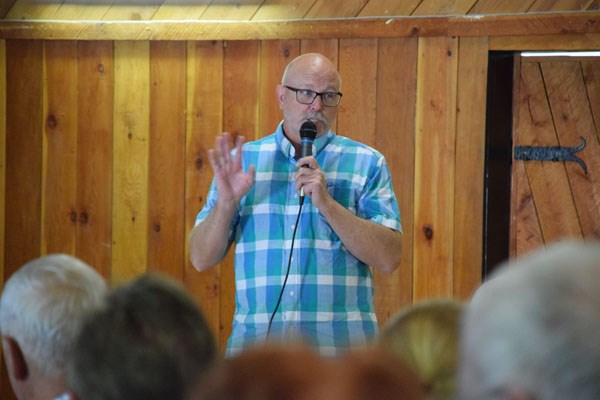The province may seem to be treating the Pender Harbour Dock Management Plan (DMP) as a closed file, but that’s not how the DMP working group sees it.
The DMP was one of several items on the agenda for the Pender Harbour Advisory Council’s May 6 community meeting, but council president Alan Stewart conceded it was the “hot topic” as he opened the meeting, which drew well over 100 residents.
The province released the DMP last month. A joint effort between the shíshálh Nation and the province, the DMP was supposed to be a way forward after more than a decade of bans on new dock construction in the area, but the 2015 draft faced a storm of criticism.
Former cabinet minister Barry Penner was commissioned to meet stakeholders, and his report pointed to a lack of proper consultation in the creation of the draft plan.
Stewart and members of the working group said Sunday that consultation still hasn’t happened.
“As far as we were concerned there was no consultation,” said Stewart.
Working group chair Leonard Lee told the crowd much the same thing, saying what consultation there was amounted to input on how to do archeological and environmental studies.
Sean McAllister, another working group member, said the government more or less ignored Penner’s report. “The government went to great expense to hire Mr. Penner… They’ve complied with one of the recommendations from Mr. Penner. The other 10 they have paid lip service to at best.”
Lee said residents of Pender Harbour understand and support the requirement to consult and accommodate First Nations on land use, but on issues like the DMP that requirement should apply to all.
“We think that the residents of Pender Harbour should be consulted and accommodated so as to balance it,” he said. “In other words, we’re suggesting we have some long-time claims to a territory and resource.”
Other working group members outlined flaws in both the archeological and environmental studies used in the DMP, and said they plan to address those flaws with the province and the shíshálh Nation.
Even the guidelines for building docks were under scrutiny. Bill Charlton from the working group said notions like having 43 per cent of the dock’s surface area “open” to allow light to hit the ocean floor and limiting dock fingers to 1.5 metres wide would be impractical in Pender Harbour.
The working group members said their bottom line is that the province and the shíshálh Nation should have followed Penner’s advice that “the DMP should be amended to eliminate the absolute prohibition of new docks in Zone 1, and instead require appropriate studies from qualified professionals to demonstrate a proposed dock will be designed in such a way as to avoid significant adverse environmental or archeological effects.”
McAllister, a lawyer, walked the audience through strategies that could be pursued if further meetings and lobbying don’t convince the province and shíshálh Nation to change the DMP.
McAllister warned if they decide to go forward with a legal challenge, it would be time consuming, costly and uncertain.
“We’re currently reviewing where we stand legally and whether there’s any basis to challenge the DMP in court,” he said. “Over the last decades the courts have swung heavily in favour of aboriginal rights and claims. However, recently there have been some decisions that have supported non-aboriginal rights.”
McAllister said the most likely route to success was continued lobbying of elected officials and strategies like social media campaigns, petitions and using access to information filings to make more of the behind-the-scenes negotiations public.
Civil disobedience isn’t out of the question, either, McAllister said.
“I’m not advocating it. I’m not suggesting it. But, it is certainly something that has crossed my mind at least,” he said and then made a reference to the protests against Kinder Morgan’s Trans Mountain pipeline expansion. “It seems that people in B.C. don’t always follow the law, especially when they’re passionate about an issue.”
During the question and answer session, some people suggested that civil disobedience could come in the form of refusing to fill out applications to “put the ball in their court,” or even sit-ins on docks slated for removal because they don’t have permits.
Others said it was time to involve communities that could see similar management plans in the lobbying effort.
Since the release of the DMP, the working group has met with provincial officials and officials from the shíshálh Nation and has been trying to set up meetings with the ministers of Forests, Lands and Natural Resource Operations and Rural Development and Indigenous Relations.
Neither the province nor the shíshálh Nation sent representatives to Sunday’s meeting, but Stewart said they’ve agreed to meet with the council executive soon.
Stewart said a lack of communication from the province and the shíshálh Nation has been a problem from the beginning.
“We had some very kind words spoken by Chief Warren Paull last September at our town hall meeting that felt very good, and were very well received. So, we’re very disappointed that we haven’t been able to continue with that dialogue, because it seemed like a door was opening,” he said.
The working group and the council are planning another public meeting on the dock issue, but a date has not been set.



